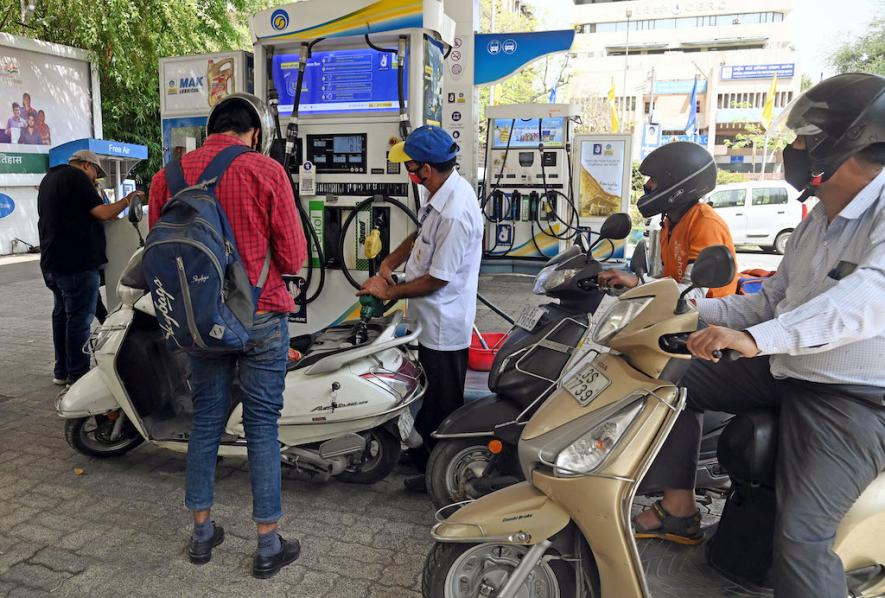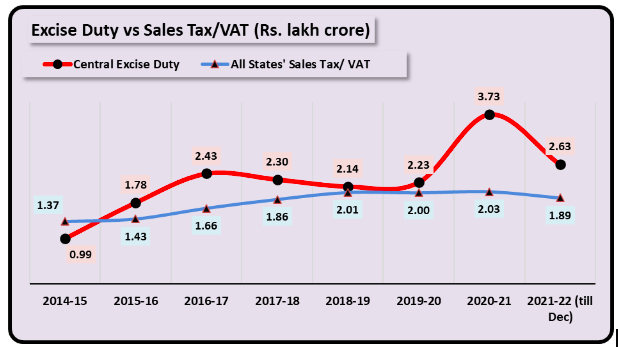Petrol/Diesel Prices: Who is Responsible for Back-breaking Hikes?

Apr 11 (ANI): An attendant refills a two-wheeler with fuel as petrol prices continue to rise, at a petrol pump, in New Delhi on Monday.
Yet again, the government has tried to obfuscate the exorbitant petrol/diesel prices by blaming state governments. This time, it was the Prime Minister himself who blamed some Opposition-ruled states for not reducing taxes like the Value Added Tax (VAT) after the central government had marginally reduced the central excise duty last November.
The average per litre price of petrol in four metros (Delhi, Mumbai, Kolkata, Chennai) was Rs112.97, and a similar average price for diesel was Rs100.55 on April 29, 2022, as per data put out by the Petroleum Planning & Analysis Cell (PPAC) of the Ministry of Petroleum & Natural Gas. Petrol prices have risen by over 62% and diesel prices by 76% since June 2017. These high prices have had a cascading effect on diverse commodity prices, including essential food items, because these fuels are used extensively in farming and transporting commodities. It may be recalled that sky-high prices have been causing massive discontent in the country.
What Prime Minister Narendra Modi was doing was to try and blunt the criticism of his government for maintaining such high prices, and thus, causing a rise in prices of all essential items of consumption. The central government taxes the oil marketing companies that provide petrol and diesel after buying it from refineries, which convert the imported crude oil into petrol, diesel and a slew of other petroleum-based products. The main tax that is levied is excise duty. The state governments levy VAT or sales tax on these fuels. How do these two streams of taxation compare? Who taxes more? Let us have a look.
Central vs State Taxes on Petroleum Products
As shown in the graph below (derived from PPAC data), excise duty collections from petroleum products (red line) increased steeply from a mere Rs 0.99 lakh crore in 2014-15, the year Modi came to power, to Rs 2.43 lakh crore in 2016-17, and then dipped marginally down to Rs 2.14 lakh crore in 2018-19. It increased slightly to Rs 2.23 lakh crore in 2019-20, but after that, it has zoomed up dramatically to Rs 3.73 lakh crore in the pandemic year 2020-21, and maintained that level in 2021-22 (data available till December 2021).

In comparison, total collections by all state governments through VAT or Sales Tax (blue line) have increased at a much slower pace from Rs 1.37 lakh crore in 2014-15 to Rs 2.03 lakh crore in 2020-21, and are set to maintain that level in 2021-22 for which again, data is available till December 2021.
Clearly, the central government is raking in big money from its excise duty collections, much more than the states put together. In fact, for the entire year of 2020-21, central government excise duty collection was 1.8 times more than the states’ total VAT/Sales Tax collection.
Look at it this way – since 2014, the central government under PM Modi has collected Rs 18.23 lakh crore by levying excise duty on petroleum products. In the same period, state governments have collected Rs 14.26 lakh crore from VAT/Sales Tax on the same products. No question that the central government has used petroleum products as a ready cash generator for itself, unmindful of the fact that its excise duty is being passed on to farmers and common people indirectly because of the unbearable increase in prices of commodities. This type of revenue generation is called indirect taxation, and it hurts the ordinary people most.
BJP leaders have argued that a share of central government taxes goes to the states after all and questioned why the states are cribbing about this high taxation. This argument is disingenuous because, in the past few years, the share of taxes from petroleum products has dwindled through some unseemly trickery on the part of the whiz kids running the Union Finance Ministry.
An ever-larger portion of the taxes kitty now comes from ‘additional excise duty’ and cesses, which are not supposed to be devolved to the states. According to a study done by the think tank PRS, the share of tax devolved to states from excise duty collections from petroleum products has nosedived from about 44% to just 4% in the case of petrol and from 65% to 6% in the case of diesel, as of February 2021. This has happened because most of the excise duty collections are now branded as cess or ‘additional’ or ‘special’. In fact, in 2019-20, only Rs 20,464 crore was given to the states, while in 2020-21, it slipped further to just Rs 19,578 crore as per revised estimates.
State Govts in Distress
After the country was forced to shift to the GST regime in 2017, state governments have been left with very few options to raise revenue through taxes. It can use VAT and sales tax only on petroleum and liquor because these are not under GST. Although there is a provision for the Centre to compensate the states for loss of revenue for some years after the imposition of GST, the central government has been very tardy in giving out this compensation. Hence, states are reluctant to reduce VAT on petroleum products, although some states did reduce it marginally last year. However, after a 137-day freeze on petroleum price hikes prompted by Assembly elections in March this year, the Centre raised these prices 12 times, successively, wiping out any reduction in prices.
This dire situation of the state governments has prompted many Opposition chief ministers to react sharply to PM Modi’s sermon to them on reducing prices. For instance, Maharashtra Chief Minister Uddhav Thakeray said that the Centre was giving step-motherly treatment to Maharashtra and alleged that Rs 26,500 crore owed by the central government to Maharashtra is still pending. West Bengal Chief Minister Mamata Banerjee too alleged that the central government owed Rs 97,500 crore to Bengal and “even if half of the amount was disbursed to the state, then it could reduce the VAT on petroleum”.
Kerala Finance Minister K Balagopal said, “Kerala has not hiked the sales tax on petrol and diesel in the last six years. It is one of the few states which has not done so. So what is it that we should reduce?”
According to a study of state budgets done by the Reserve Bank of India, own revenue as a share of revenue expenditure fell from 53.2% in 2019-20 to 45.6% in 2020-21 and was estimated at 52.7% in 2021-22. The major reason for this was the economic downturn and stoppage of the economy due to the pandemic and lockdowns in 2020 and 2021. But it is aggravated by the Centre’s increasing stranglehold over finances. In such conditions, the situation of States’ finances is becoming fragile day by day. It is for the Centre to help them out in such dire conditions – this is what true cooperative federalism would be.
Get the latest reports & analysis with people's perspective on Protests, movements & deep analytical videos, discussions of the current affairs in your Telegram app. Subscribe to NewsClick's Telegram channel & get Real-Time updates on stories, as they get published on our website.
























